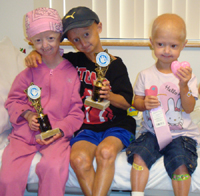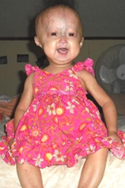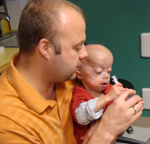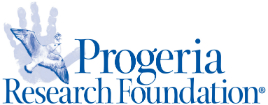Moving Ahead at Lightening Speed as The Progeria Triple Drug Trial Begins!

Hayley from England and Michiel from Belgium are all smiles as they pose with their trophies for completing the first-ever Progeria clinical drug trial on Friday, August 14, 2009. They also, along with Michiel’s sister Amber (right), completed their first visit for the triple drug trial that week.
The Progeria Research Foundation and Children’s Hospital Boston are once again partnering to conduct a second clinical trial for children with Progeria. This exciting and much larger trial includes 45 children from 24 countries, speaking 17 different languages!
Summary: Researchers have identified two additional drugs that, when used in combination with the current FTI drug being tested, may provide an even more effective treatment for children with Progeria than FTI’s alone.
Of course, a clinical trial of this magnitude is expensive to manage, and there are precious few sources of support for rare disease research. But in October 2009, the NIH’s National Heart, Lung, and Blood Institute awarded the triple trial team a prestigious “Grand Opportunities” grant that will cover many of the costs. We are thrilled to have earned this extraordinary support from NIH.
However, the grant doesn’t cover all of the trial expenses. PRF still needs to raise about $150,000 for some costs not covered by the grant.
Click here to donate to the triple drug trial and help make the GOAL of treatment and cure a REALITY!
The new generation of children PRF is helping…
 “EVERYONE has been so wonderful. To us you are ALL GOD SENT and we APPRECIATE all that you do for these little angels. Our family is so overwhelmed with excitement and all sorts of emotions with Adalia’s trip to Boston this weekend, I can’t even begin to type the words of how we are feeling”.
“EVERYONE has been so wonderful. To us you are ALL GOD SENT and we APPRECIATE all that you do for these little angels. Our family is so overwhelmed with excitement and all sorts of emotions with Adalia’s trip to Boston this weekend, I can’t even begin to type the words of how we are feeling”.
 “This new medication for Zach gives us a renewed hope that his heart will be stronger, his smile will be brighter and his life will be longer. This new drug trial is an answer to our prayers. Thank you to everyone involved with PRF who made this happen…the doctors, the researchers and the staff. You are our heroes!”
“This new medication for Zach gives us a renewed hope that his heart will be stronger, his smile will be brighter and his life will be longer. This new drug trial is an answer to our prayers. Thank you to everyone involved with PRF who made this happen…the doctors, the researchers and the staff. You are our heroes!”
Cam and his dad learn how to mix the FTI drug with a sweetener.
“On behalf of Cam and our family, thank you all at PRF so much for all you have done! We would have been lost in a world of confusion and grief without you. Instead, we live in a world of hope and purpose. Thank you again and again! With much love and respect,”

Recent Comments